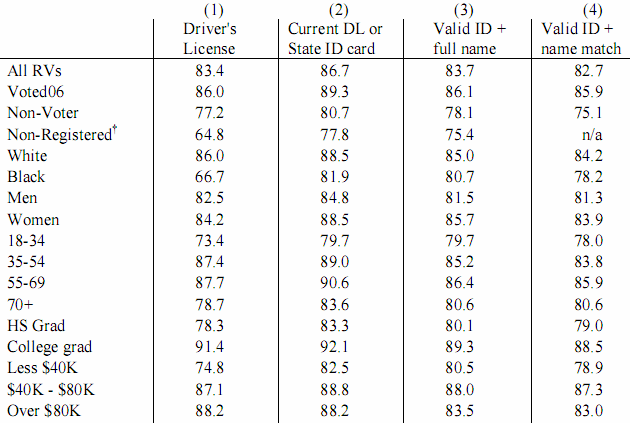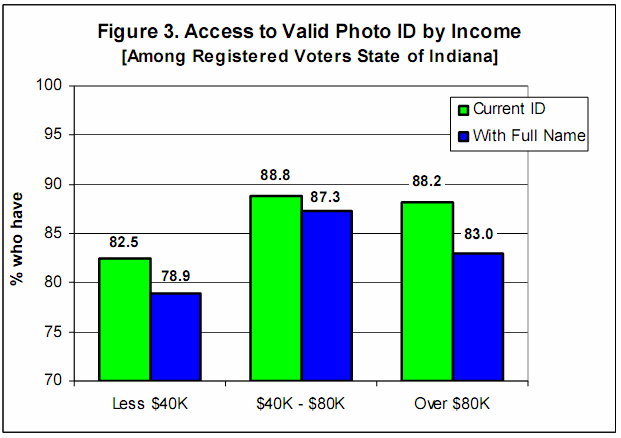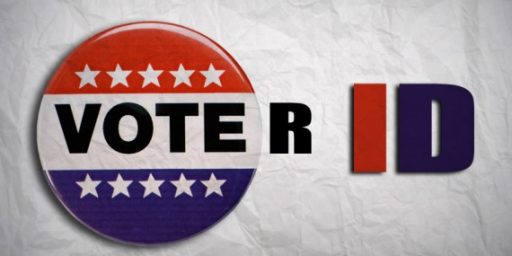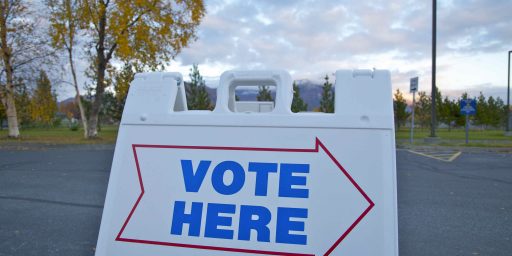Voter ID Requirements Disenfranchise Wealthy
Kevin Drum cites an interesting study (PDF here) of Indiana residents and their access to valid photo identification. His summary fairly represents that of the study authors:
By a substantial margin, the Indiana residents most likely to possess photo ID turn out to be whites, the middle aged, and high-income voters. And while this is undoubtedly just a wild coincidence, these are also the three groups most like to vote for Republicans.
There are numerous colorful bar graphs but this summary table presents all of the data together:

What I find most striking here is not the inter-group differences, which I agree are significant, but the fact that so many people haven’t bothered to obtain ID cards. It’s ridiculously easy to get one, after all.
Because my dad was in the Army, I’ve had at least one photo ID card literally as long as I can remember. Even absent that, though, I’ve had a state driver’s license since I was 16 and have had various student or work IDs in addition to that most of the time. My ATM card has my photo on it. I’ve got a passport.
Now, obviously, the poor or urban dwellers are less likely to drive, let alone travel overseas. But Indiana, which requires picture ID for voting, makes it rather easy to get one. For free:
If you do not possess an ID that is acceptable for voting purposes, PL 109-2005 requires the BMV to issue an Indiana State ID Card free of charge.
To obtain a free ID card for voting purposes from any BMV branch, you will need to supply the necessary documentation, as explained in the Necessary Documentation Checklist.
The main obstacle on the Necessary Documentation Checklist is obtaining a copy of one’s birth certificate or other primary proof of U.S. citizenship. Given that similar requirements obtain for registering for school, participating in extracurricular activities such as sports, getting married, most jobs, and all manner of other life events, it’s not exactly a major deterrent. Indiana also provides Exemptions for the indigent and those with religious or other objections to presenting picture ID. They’re a minor nuisance, however, since it requires a trip to the county election office.
Frankly, obtaining a valid ID card as hardly more onerous than registering to vote, period. If you’re not willing to do that much, you’re incredibly unlikely to vote, anyway.
As to the post headline, it’s tongue-in-cheek. It’s based on this chart:

Indiana’s wealthy are more likely to have a picture ID than the poor — but less likely than the middle class. Still, if the requirement was an underhanded way to disenfranchise Democrats and advantage Republicans, you’d think that they wouldn’t undercut the richest Hoosiers.





I don’t think requiring picture ID disenfranchises anyone. Everyone has the same rules, the state provides ID for free-so there is no cost required.
I think the real objection is that to get the picture ID you have to prove you are a citizen and eligible to vote. Although those opposed won’t ever admit this-but part of having election integrity is making sure those voting are eligible to do so.
So, James. Can’t see the charts for some reason in Safari, but even so, what you seem to be missing is that there’s a whole lot less wealthy than there are middle class and a whole lot more poor people than either of the previous groups. So, while I can’t tell for sure if your charts display this fact, it’s pretty clear that “likelihood” wouldn’t make any difference in disenfranchising, percentage-wise.
WRT just-mes rant
I think the real objection is that to get the picture ID you have to prove you are a citizen and eligible to vote. Although those opposed won’t ever admit this-but part of having election integrity is making sure those voting are eligible to do so.
Um, every single study ever done has shown precisely the opposite. There’s plenty of incentive on your side, just me, to show that there is massive problems with voting fraud. But every single study ever done shows precisely the opposite. So, while you’re entitled to your uneducated opinion, it’s objectively provable that you’re completely wrong.
For a party who’s mantra is all about unfunded mandates and cost/benefit analysis, it’s pretty clear that voter id laws have nothing to do with stopping fraud as it simply can’t be found anywhere.
If it walks like a duck and quacks like a duck…
Frankly, obtaining a valid ID card as hardly more onerous than registering to vote, period.
According to a new study (pdf), part of the Brennan Center’s amicus brief in the Indiana case, that’s not true. It found the photo ID requirement depresses turnout among the poor (and therefore disproportionately affects minorities) and that “voter ID laws are subject to arbitrary and discriminatory enforcement by poll workers.”
I’d just like to emphasize this fact. Registering to vote out here in CA is literally like falling off a log. In every post office there’s a form you simply fill out and drop it off in the slot. That’s it. Registering for an ID card is several orders magnitude more “onerous” than that.
I’d really be interested in James detailing the voter registration processes that he’s experienced and paralleling them against getting – say – his driver license, backing up his assertion.
The stated goal of those who push picture ID as a requirement to vote claim massive voter fraud by non citizens as the reason. I live near the southern border in NM and a polling place or any government facility is last place you will find illegal immigrants. And of course, the voter fraud argument is a myth, with voter suppression of the poor the real goal.
Um, every single study ever done has shown precisely the opposite. There’s plenty of incentive on your side, just me, to show that there is massive problems with voting fraud. But every single study ever done shows precisely the opposite. So, while you’re entitled to your uneducated opinion, it’s objectively provable that you’re completely wrong.
I want to see some links to all of these studies.
Also, is it your argument then that people who are ineligible to vote don’t register when there is nothing required of them to prove eligibility beyond filling out a voter registration card?
Um, can you not see the link I did provide? Here it is again, so you can simply click on it to read the study. I know it’s just one, but I’m pretty sure you can google as well as I and even a cursory google search of mannning’s quality will show a ton of links you can peruse at your leisure.
The real question is do you have anything to support your beliefs? Sure, call me on my claims but at least have the stones to back up your own.
is it your argument then that people who are ineligible to vote don’t register when there is nothing required of them to prove eligibility beyond filling out a voter registration card?
I’m not making any arguments about why there isn’t massive voter fraud. The burden isn’t on my position to show why there isn’t massive fraud, nor is it required that I give any explanation for the lack thereof.
What is required, though, is for you to come up with evidence of fraud before you start asserting that it exists. And the simple fact is, that despite massive incentive to show such fraud exists, there simply isn’t any to speak of.
Which leaves people like you in a bit of a quandary as to why you’re supporting doing something about a problem that doesn’t exist.
Which leaves people like you in a bit of a quandary as to why you’re supporting doing something about a problem that doesn’t exist.
…and supporting policies that wouldn’t solve the problem even if it did exist.
The republicans in my state of NM stay in a permanent state of outrage over massive voting fraud they claim exists. You may remember the recent dust up with the [republican] US Attorney David Iglesias being prodded by state repub leaders to bring cases of fraud they imagined. Turns out after repeated investigation on the federal and state levels, zero evidence of voter fraud was found
On the other hand, every election we have to put up with GOP operatives challenging anybody they ‘believe’ suspicious which generally means “brown people”. This activity always slows down voting to a crawl with long lines and waits, that I’m sure dissuades some to not vote at all.
As they say, it’s not a bug, it’s a feature.
I thought you were supposed to have a Ph.D. in political science?!?! Why did you ignore the regression tables? Table 8 reveals how silly your statement is.
Joyner-
It’s ridiculously easy to get one, after all.
All you’ve accomplished here is reveal that you don’t interact with poor or elderly people in urban environments. The two things that those people don’t have are time and money, both of which are necessary to get a government-issued ID.
Um, can you not see the link I did provide?
Well actually no I didn’t. I have screwy colors on my monitor at times (generally it doesn’t affect what I do on the internet much) but red often appears to be black, so I didn’t see the link-I had to wave the mouse over the words to find it.
But I did find the fact that in key findings they essentially said they needed better data, better election administration, transparency and responsible journalism, which indicates right now the data ain’t that great.
And it probably isn’t, because voter or election fraud isn’t something easy to find or easy to prosecute, because so much of it is done under the cloak of anonymity.
I do notice that for the purposes of the study you link to, they seem to exclude things done by ACORN where fake registrations forms are filled out-whether that kind of fake registration leads to fake votes or not is for further research, but at the very least, when things like that happen-it is of concern.
But at the very least we should have a system where only eligible voters are able to register and vote-and I don’t see how anyone who wants open and fair elections would be opposed. So how do you propose states seek to make sure those voting are eligible, if you are opposed to ID requirements?
I don’t have any links-and at the moment can’t read your link any further (I have chauffer duty in about 5 minutes).
I will try to finish reading and do some searching later.
I don’t see how anyone who wants open and fair elections would be opposed.
Um, because the system being proposed throws our fellow citizens under the bus on the flimsiest of suppositions.
If voter fraud is a genuine concern, the only solution that protects the most fundamental of civil rights is universal registration and a voter identification program that is fully funded and puts IDs into every voters’ hands.
Are you willing to help pay for that through increased taxes, or are you not that concerned that this is a problem?
I am in the process of reading and one issue I take already with the link is that it essentially makes the argument-because there are very few convictions it doesn’t happen.
All it takes is to compare convictions rates to victimization reports to realize that a lot of crime goes unreported. My college degrees were in criminal justice, and one thing we always did when considering crime was look at and compare official stats (arrest and convictions) to those reported by victims. In pretty much all cases crime reports of victimization were much higher than arrest and conviction reports.
The problem with voter fraud though-is the victims don’t know they were victims so there isn’t a way to do a victimization report, but I am sure the ladies at NOW would have hissy fits if you tried to disregard victimization reports on rapes or even domestic violence-there are huge discrepencies between domestic violence victimization reports and arrest/conviction rates.
And I realize the author is arguing that those who believe there is fraud think it is due to lack of prosecution-I think it is mostly due to the fact that victims don’t really know when they have been victimized enough to report it.
In a state where all you have to do is mail in a voter registration application with no proof of citizenship or residency, and then you show up to vote and aren’t asked for anything other than your signature, it is pretty hard for the little old ladies (at least in my ward they are little old ladies) to know you aren’t who you say you are.
I have never been asked to even show my voter card when voting-they just have me sign, and I have never seen anyone asked to show their voter card.
It has always been difficult to measure fraud or even specify it, and it is important to stress that until better evidence comes to light, we will not be able to compile comprehensive statistics on levels of cheating by voters. Researchers are hampered in studying voter fraud because government agencies fail to track it and are often unresponsive to information requests.
This conclusion pretty much says-the prosecutions are low, but we don’t have much data to go off of, and we need more.
Which makes sense, but it also means you can’t argue either way with much certainty that voter fraud isn’t a concern.
Which comes back to how to make sure those registering to vote and voting are eligible voters-I happen to think asking for a picture ID is reasonable. You may not-but either way I don’t think the requirement is something unatainable, people can barely do anything in society at this point with a picture ID. Shoot you can’t even sign up for public assistance without a photo ID.
If voter fraud is a genuine concern, the only solution that protects the most fundamental of civil rights is universal registration and a voter identification program that is fully funded and puts IDs into every voters’ hands.
I don’t see any reason why this has to be government funded by everyone, if a driver’s liscense or other photo ID will do.
I have no problems funding a program that provides a free photo ID to anyone who does not have a liscense provided it requires proof of citizenship and residency.
Most people pay for a driver’s liscense, even on the charts, the vast majority of people have some form of photo ID.
All it takes is to compare convictions rates to victimization reports to realize that a lot of crime goes unreported.
The question you should be asking is how do we know a lot of crime goes unreported? And if you know the answer to that, then you should realize that the same techniques can be use to estimate the amount of voter fraud that goes unreported. Further, the reasons why victims underreport isn’t the same reasons why voter fraud would go unreported (no fear of retribution, no shame, for example). Realizing this, it’s pretty clear that analogies to crime reporting don’t hold much water and even if you are hard over on that analogy a lot of the reasons for underreporting don’t come into play with voter fraud, so there’s far less incentive (or disincentive, as the case may be) to under report. Going even further, there’s a HUGE incentive for people on your side of the fence to actually uncover instances of voter fraud. Certainly, as the whole AG firing scandal has revealed, there’s been a whole lot of political pressure from the very top of our government to come up with statistically significant cases of voter fraud.
So, again, where is it?
I think it is mostly due to the fact that victims don’t really know when they have been victimized enough to report it.
I really think you’re relying on conjecture and don’t have any evidence to support this claim. The people who man the polls have a high incentive to make sure fraud doesn’t occur. Not sure if you realize this, but voting actually puts politicians into power and takes them out of power. There’s enormous pressure on voting officials and pressure on people all the way down the line. Claiming that it’s unreported because these people don’t know they’re being victimized is rather absurd.
it is pretty hard for the little old ladies (at least in my ward they are little old ladies) to know you aren’t who you say you are.
Really? FIrst, the addresses are all verified against real, actual addresses. So, you’d have to use a real address – you can’t just make one up. Second, you run the high risk of voting for someone who already or will vote for that address. Again, there are ways of actually auditing this stuff and – as I have repeatedly said – there’s a lot of incentive to find fraud.
What your argument consists of is questioning mechanisms as to why things work and because you can’t come up with what you find as an acceptable answer, postulating that fraud must exist – but we somehow can’t find it.
but it also means you can’t argue either way with much certainty that voter fraud isn’t a concern.
It’s always a concern. The problem with your argument structure is that there is no evidence it is occurring, and – I can’t stress this enough – there’s clearly a lot of incentive to find it.
You may not-but either way I don’t think the requirement is something unatainable, people can barely do anything in society at this point with a picture ID.
Well, as the report that James linked to shows, it isn’t that it’s unattainable, it’s that people don’t do it and the effects of this are to disenfranchise a voting population that conveniently is on the other side of the issue. Strange how that works out.
Shoot you can’t even sign up for public assistance without a photo ID.
And it isn’t a coincidence that study after study has shown that there is a large number of people who are eligible for public assistance who never get it precisely because of this requirement. So you have, in effect, proven exactly why requiring an ID is going to disenfranchise a non-trivial segment of the voting population. Further, a segment which trends democrat. As I said, very convenient.
The bottom line, as I’ve been told by many conservatives time and time again wrt to other issues, there’s a cost/benefit analysis. So far, there’s no evidence that there’s any statistically significant voter fraud going on. The mechanisms you want to put into place will, as studies have shown, result in voter disenfranchisement. So, what you’re expecting us to do is to disenfranchise voters to solve a problem you can’t come up with any evidence that it exists.
That’s a very, very strange position to hold in a democracy.
Problem is you aren’t convincing me they are really disinfranchised.
If they want to vote, and the ID is provided for free, then they will do what is needed to vote.
Maybe the way to fix problems with voting aren’t requiring ID’s, but there does seem to be a problem at the very least-there have been more than enough scandals reported that indicate some real problems in how we register and keep track of voters.
But at the very least I would like to be confident that the people registering to vote are eligible voters, whether voter fraud is rampant or not, this is one area where there doesn’t seem to be much integrity.
In order to believe significant voter fraud exists, and by significant I mean to a degree that alters, or nearly alters a statewide federal ballot, you would have to accept the premise that at least hundreds if not thousands of people individually or in some kind of cooperation voted illegally.
These would either be non-citizens ineligible to vote, or citizens voting more than once. All of them would have to first register illegally or more than once in different locations or vote on election day with provisional ballots to be verified later. Most states have some requirement for residency, if not a drivers license then a utility bill or something similar.
You would also likely need some collaboration with voting precinct persons to at least look the other way.
Isn’t it much more likely that any significant election fraud occurs institutionally by voting officials, rather than by individual voters with or without picture ID’s.
Isn’t it much more likely that any significant election fraud occurs institutionally by voting officials, rather than by individual voters with or without picture ID’s.
This I would agree with.
And I would also say that I am not convinced there are huge amounts of voter fraud to the point that it would significantly change an election-at least not at a national level-voter fraud at a local level where a few votes can make a difference is another thing.
But that doesn’t mean there shouldn’t be integrity in the area of who registers to vote and whether they are eligible voters and the person casting the vote is that eligible voter.
But that doesn’t mean there shouldn’t be integrity in the area of who registers to vote and whether they are eligible voters and the person casting the vote is that eligible voter.
So, you’re no longer making the case that there is statistically significant voter fraud. But you still want IDs. As has been repeatedly stated, this is proven to disenfranchise voters.
Now, why you want to do this is odd. You don’t have to do this to stop the fraud that doesn’t exist. It’s proven to disenfranchise voters.
Is it some Calvinistic thing? The only thing your desire will do is create a non-democratic system.
Again, a taking such a position is truly bizarre in our political system. It seems to be against the very principles upon which this society is built. And accomplishes nothing?